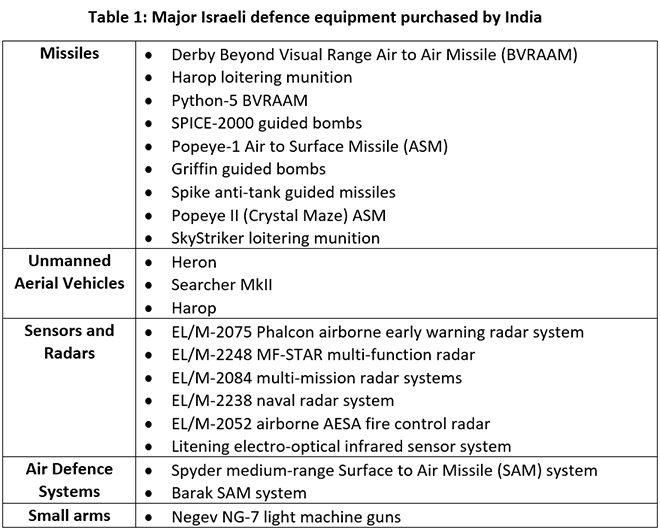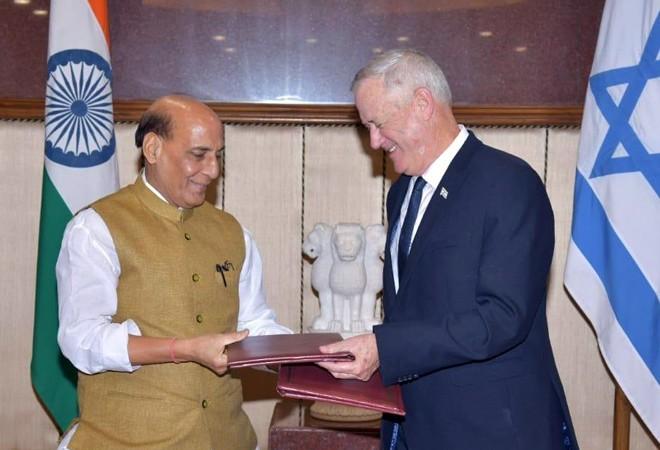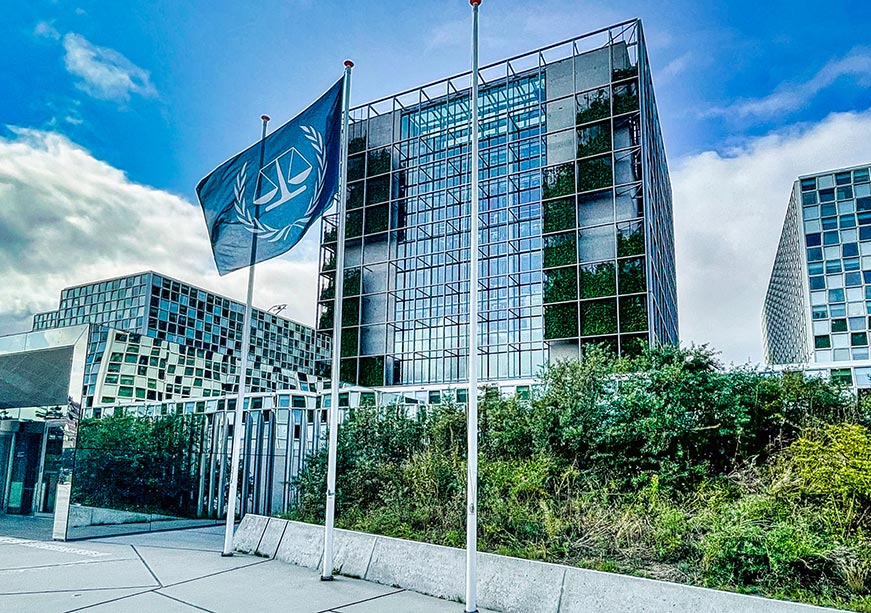Cooperation in various areas ranging from technology to defence has led to the opening up of a new potential partnership between the two-tech savvy democracies: India and Israel.
The Israeli Defence Minister, Benjamin Gantz, recently concluded a long-pending visit to India. Both countries decided to expand their defence cooperation during his visit, focusing on the emerging technologies. Gantz and his Indian counterpart, Rajnath Singh, signed the ‘India–Israel Vision on Defence Cooperation’ to put together a comprehensive 10-year roadmap to identify new areas of collaboration. The two ministers also exchanged a ‘Letter of Intent’ to enhance cooperation on futuristic defence technologies.
This focus on technological cooperation precedes the robust ties in the defence and security sector, ning arms sales, military exchanges, and counterterrorism engagement. This article gives a broad overview of the bilateral defence relationship and suggests a way forward for defence technology cooperation.
Driven by the shared threat perception of being surrounded by hostile neighbours, both countries deepened their exchanges in multiple spheres, including extensive people-to-people contact.
Since establishing ties in 1992, India and Israel have traversed a long path. Driven by the shared threat perception of being surrounded by hostile neighbours, both countries deepened their exchanges in multiple spheres, including extensive people-to-people contact. The defence and security partnership provided the anchor for this bilateral interaction. The Kargil War of 1999 cemented this cooperation when Israel was one of the few countries to provide direct military assistance to India. Notably, these robust ties precede the India–US defence cooperation which materialised much later.
Defence trade
Since then, India has tended to rely more on Israeli technology and equipment for border security and counterterrorism. This has made India the largest purchaser of Israeli weapons in the last decade, surpassing even the United States, Israel’s principal military ally in West Asia (see figure 1).
Figure 1: Trade Indicator Values of Israel’s arms exports (2011–2021, figures in US$ millions)

Source: SIPRI Arms
Transfers Database
India’s arms purchases have provided Israel’s defence-industrial base with steady and much-coveted access to a sizeable market. This passage to the Indian market is even more significant for Israel’s defence industry since the United States, concerned with the qualitative upgrade of Chinese military capabilities, had vetoed Israeli arms sales to China in the late 1990s and early 2000s.
Unmanned Aerial Vehicles, missiles, and radar systems have dominated India’s purchases from Israel, totalling worth US$ 4.2 billion (2001–2021) (see figure 2 and table 1).
Figure 2: India’s arms imports from Israel (2001–2021, figures in US$ millions)

Source: SIPRI Arms
Transfers Database
Table 1: Major Israeli defence equipment purchased by India

Source: SIPRI Arms
Transfers Database and IISS Military Balance 2022
These equipment and platforms have undoubtedly strengthened the Indian surveillance and operational capabilities, particularly in the Kashmir Valley and on the borders. For example, Israeli sensors, Heron drones, hand-held thermal imaging devices, and night vision imaging equipment have proved advantageous for the Indian Army in checking infiltration on the Line of Control and counter-insurgency operations in the Valley’s hinterland. Likewise, last March, the Indian Army leased four Heron drones from Israel Aerospace Industries (IAI) to deploy them on extended surveillance missions on the Line of Actual Control, amidst the border stand-off with China.
Defence technology cooperation
Beyond defence trade, India and Israel have also been engaged in defence technology cooperation. The symbol of their success is the Barak-8 air and missile defence system. Co-developed by the IAI and India’s Defence Research Development Organisation (DRDO), Barak-8 is available in land and maritime versions. It can intercept targets like fighter aircraft, drones, ballistic, and cruise missiles up to 150 km. Further, IAI is also collaborating with the Hindustan Aeronautics Limited to convert second-hand Boeing-767 civilian aircraft into mid-air refuellers for the Indian Air Force.
Another collaboration between Elbit Systems and Bharat Forge, called BF Elbit Advanced Systems, supplies artillery guns, guided munitions, and mortar systems to the Indian military.
Building on the success of Barak-8, in September 2020, India and Israel established a bilateral sub-working group on defence industrial cooperation. This group is expected to facilitate further technology transfers to India, enable utilisation of bilateral resources, and share industrial capabilities.
Israel’s participation in ‘Make in India’
Supporting the Indian government’s focus on building national defence-industrial capabilities, Israeli companies have forged partnerships with the Indian private sector. This replicates the pattern followed by the major American aerospace companies, which too have built successful commercial collaborations with their Indian private sector partners.
The IAI, Elbit Systems, and Rafael Advanced Defense Systems have set up joint ventures with Bharat Forge, Tech Mahindra, Adani Group, and Tata Advanced Systems to produce niche sub-systems and homeland security systems. For instance, IAI’s subsidiary, ELTA Systems, has a joint venture with the Tata Advanced Systems, called Hela Systems, which manufactures communications, electronic warfare, and homeland security systems. Another collaboration between Elbit Systems and Bharat Forge, called BF Elbit Advanced Systems, supplies artillery guns, guided munitions, and mortar systems to the Indian military. Notably, Israeli companies have quickly identified and utilised the niche technological solutions offered by Indian companies. For instance, Bengaluru-based Tonbo Imaging’s specialised electro-optics technology has powered Israel’s precision-guided bombs for years.
The agreement on enhancing partnership in futuristic defence technologies is an effort in the right direction.
Of course, a big challenge for these companies is uncertainties related to India’s protracted defence acquisition procedure. For instance, in 2019, Elbit Systems was declared the lowest bidder—L1, in the bid to purchase towed artillery gun systems for the Indian Army. Yet, after extensive price negotiations, the government shelved the order, preferring indigenous alternatives. Similarly, plans to acquire an additional fleet of Phalcon airborne warning and control system-enabled planes have stalled for years.
Stepping-up defence collaboration
But beyond these usual challenges, there is a real opportunity for New Delhi and Tel Aviv to advance cooperation. The agreement on enhancing partnership in futuristic defence technologies is an effort in the right direction. Given Israel’s strong focus on R&D, both sides can collaborate on technologies such as additive manufacturing and advanced battery technology and power sources, besides usual flagships such as artificial intelligence, blockchain, and robotics.
To realise the true potential of this partnership, what is needed now is the identification of mutually beneficial technologies, followed by a formal collaboration between Israel’s Maf’at (Directorate of Defence Research & Development) and India’s DRDO along with greater engagement between their respective innovation ecosystems. This will create a sustainable path for collaboration between the two tech-savvy democracies.











